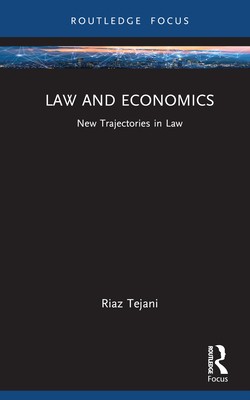
- We will send in 10–14 business days.
- Author: Riaz Tejani
- Publisher: Routledge
- ISBN-10: 1032396598
- ISBN-13: 9781032396590
- Format: 14 x 21.6 x 1 cm, hardcover
- Language: English
- SAVE -10% with code: EXTRA
Reviews
Description
This book examines the contemporary significance of the Law and Economics movement.
Drawing on anthropology, sociology, political economy, and ethics, the book traces the influence of lawyer-economists in developing and operationalizing key ideas - for instance human capital and structural adjustment - that have come to be grouped under the heading of 'neoliberalism'. It then examines how these ideas are tied to global environmental harm and to wealth inequality. Largely because of such ties, sociolegal studies tends to dismiss economic thought. This book, however, forges a path between economic and sociolegal approaches. Discussing thinkers such as Foucault and Polanyi, Calabresi and Sunstein, it demonstrates both the possibilities and limitations inherent in economistic approaches to law. Bringing together disparate and sometimes conflicting literatures, the book thereby eschews disciplinary taboos in the name of a creative, sympathetic, and critical rereading of the key ideas of Law and Economics.
This book will be of interest to students and researchers in sociolegal studies, anthropology, sociology, and economics.
EXTRA 10 % discount with code: EXTRA
The promotion ends in 11d.01:40:04
The discount code is valid when purchasing from 10 €. Discounts do not stack.
- Author: Riaz Tejani
- Publisher: Routledge
- ISBN-10: 1032396598
- ISBN-13: 9781032396590
- Format: 14 x 21.6 x 1 cm, hardcover
- Language: English English
This book examines the contemporary significance of the Law and Economics movement.
Drawing on anthropology, sociology, political economy, and ethics, the book traces the influence of lawyer-economists in developing and operationalizing key ideas - for instance human capital and structural adjustment - that have come to be grouped under the heading of 'neoliberalism'. It then examines how these ideas are tied to global environmental harm and to wealth inequality. Largely because of such ties, sociolegal studies tends to dismiss economic thought. This book, however, forges a path between economic and sociolegal approaches. Discussing thinkers such as Foucault and Polanyi, Calabresi and Sunstein, it demonstrates both the possibilities and limitations inherent in economistic approaches to law. Bringing together disparate and sometimes conflicting literatures, the book thereby eschews disciplinary taboos in the name of a creative, sympathetic, and critical rereading of the key ideas of Law and Economics.
This book will be of interest to students and researchers in sociolegal studies, anthropology, sociology, and economics.


Reviews